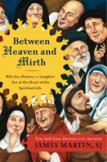Joy to the World
This book ought to find a place on everybody’s Christmas list this year, both the wish list and the shopping list. It is a book to be received with joy, savored and given. It reaffirms the fundamental mystery of God’s love and redemption that is at the heart of the Christmas mystery of Incarnation.
The overall design of the book is simple and straightforward, characteristics that mark the best spiritual writing. The subtitle suggests the plan: why joy, humor, and laughter are at the heart of the spiritual life. In nine chapters and a conclusion, James Martin, S.J., distinguishes among the three and carefully but simply explores the theological and scriptural foundations for each. In doing so he mingles scholarship, personal reflection, anecdote and jokes. He moves from the profound to the lighthearted, from God to everyday pratfalls with grace, taking the reader with him as he goes.
Martin confronts the issue of “religious seriousness” right up front (Chapter Two) and explores historically, if briefly, why and how so many people experience religion generally, and Christianity specifically, as gloomy and disheartening. He examines how, right at the beginning, the laudable goals of the New Testament writers tended to obscure the humor of Jesus himself, and he finds traces of humor in the Gospels and, indeed, in many of the Old Testament writings that preceded them. He examines the thinking of influential early Christian fathers and explores the possibility that humor and especially communal expressions of joy were feared as subversive by the religious authorities, especially in societies where such authorities had secular power as well.
Chapter Three recalls the simple truth that joy is a gift from God. Here Martin culls some of the best-known episodes and sayings from very popular saints and adds others, saints and sayings, less well-known. Sts. Katherine Drexel and Teresa of Avila trade wise witticisms with Sts. Francis de Sales and Francis of Assisi. Pope John XXIII adds his own remarks, showing that he too had joined the long, illustrious line of those who made themselves “fools for Christ’s sake.” This leads directly to Chapter Four, “Happiness Attracts,” in which Martin gives “11? serious reasons for good humor.” In spite of its whimsical title, this chapter points out the very important relationship between humor and the work of the evangelizer as well as the integral role humor plays in the virtues of humility, courage and hospitality. Martin shows the power of humor in the church’s prophetic role, enabling the person of faith to speak truth to power and shock listeners into recognizing the realities of the kingdom, much as Jesus did in the parables.
In subsequent chapters, Martin shows the way joy gives us insight into our true vocation and how God might well be “in favor of excessive levity.” By such levity God keeps us in our place, as it were, aware of the foibles and limitations of our humanity and our need for redemption. Again, such levity can subvert our personal tendency and the church’s frequent recourse to pomposity, to the conviction that, as a church, we are more than God’s instrument and wielders of an authority that belongs to God alone.
Almost every chapter of Martin’s work unfolds the riches of Scripture. But additionally, he devotes three separate small sections to a more detailed commentary on a specific passage: Psalm 65, the Lucan narrative of the Visitation and Paul’s First Letter to the Thessalonians.
I have said above that his work is grounded in the fundamental Christian mysteries; but in fact Martin calls upon the wisdom of many religious traditions, demonstrating that however the divine reality may be encountered, God’s presence is accompanied by joy. Not that he in any way encourages a Pollyanna faith, nor an unprophetic, which is to say empty, proclamation of the Gospel. Nor does he suggest anything like the popular message that if one believes firmly, all the goods of the world come magically to hand. Martin speaks of how joy can be present in small and large sorrows and even when we experience deep anger at injustice.
He could have done more with this theme. He speaks of joy’s relationship with sadness at significant length; but he only affirms that God speaks to us through our outrage at the injustice we both see and experience. How joy and even laughter might shape the way we hear God’s voice in the outrage calls for further exploration. But he ends with very practical examples of how to stimulate joy and laughter in our daily lives of prayer, work and relationships and how such prayer, in particular, might indeed bring us to understand what our righteous anger demands of us.
Many decades ago, when I stood at a turning point in my young life, I had a conversation with an older, very holy religious woman. We spoke of the possible paths I might take, and when the conversation was over and I was leaving her office, she called me back from the door. “Remember,” she said, “that God can shape you by great joy as much as by great sorrow.” I have returned to her words many times in what has turned out to be quite a long life, trying to understand them in changing circumstances and choices. Between Heaven and Mirth is something of a commentary on her sage, prophetic advice.
This article also appeared in print, under the headline “Joy to the World,” in the October 3, 2011, issue.








